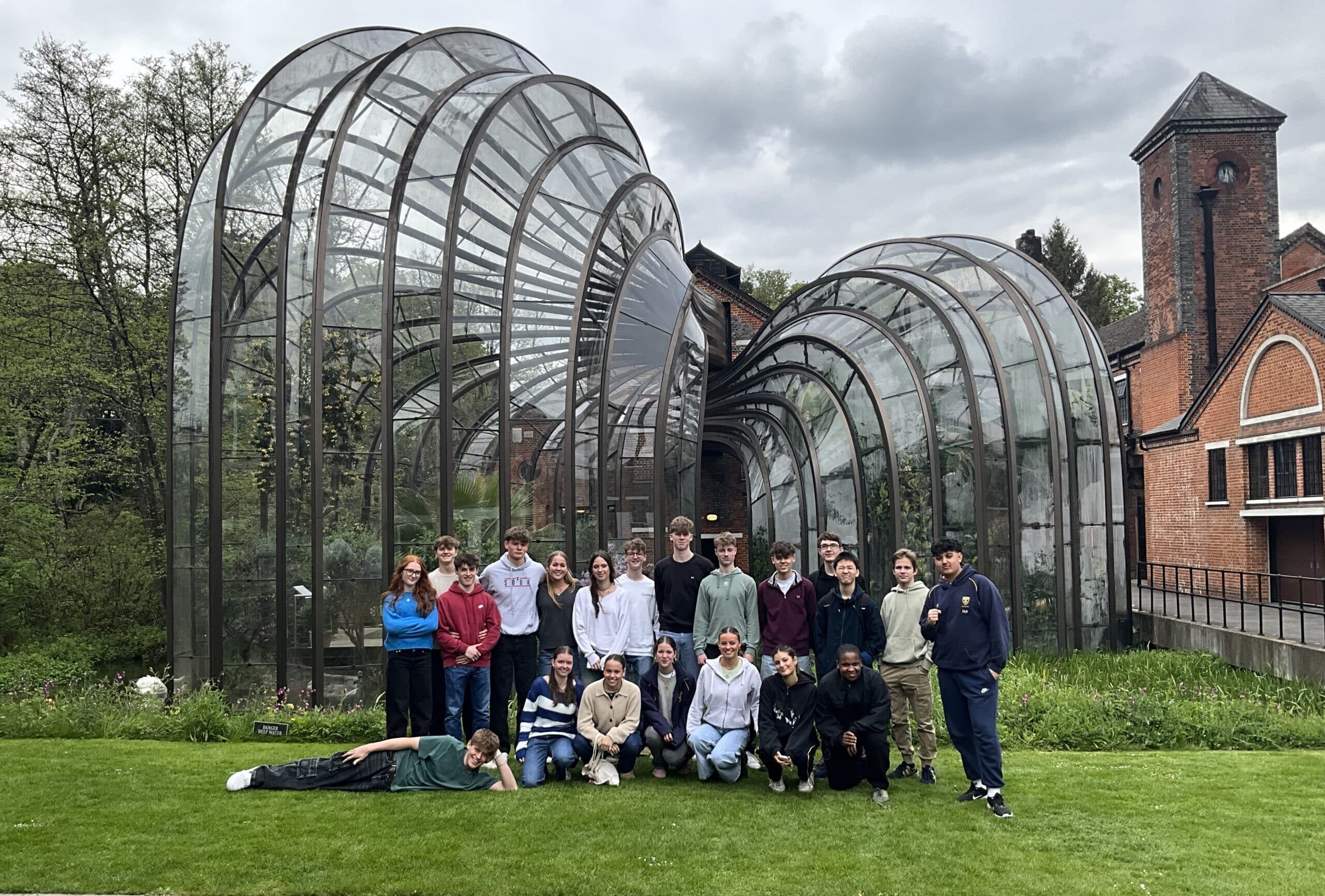 It was an inspired concept of director Martin Allison to couple Dario Fo’s ‘Accidental Death of an Anarchist’ with a 32-minute prelude of three scenes from Brecht’s ‘The Resistible Rise of Arturo Ui’, focusing on the warehouse fire that parallels the burning of the Reichstag. One might imagine that ‘Guardian’ editor Alan Rusbridger might be delighted that his old school can still present socialist theatre in so palatable a way. But this was no spoonful-of-sugar, easy-listening version of these great political pieces: the full gamut of Brechtian theatre techniques were engaged to make the audience view our world in a rich and strange light. As the characteristically intelligent but readable programme notes explained, Brecht is done no favours by the exaggerated translation of Brecht’s ‘Verfremdungseffekt’ as ‘alienation’ and the use of projection and touches such as the beamlight operators (James Coates and Ben Foster) being in costume, helped dislocate the audience from the increasing assumption in our part of the world that the theatre is a place of bourgeois comfort and cosiness. The paradox is that through such a parable the theatre-goer can see more clearly that the actors are telling a story about now, not performing a history play: “Do not rejoice in his defeat, you men. For though the world has stood up and stopped the bastard, the bitch that bore him is in heat again.”
It was an inspired concept of director Martin Allison to couple Dario Fo’s ‘Accidental Death of an Anarchist’ with a 32-minute prelude of three scenes from Brecht’s ‘The Resistible Rise of Arturo Ui’, focusing on the warehouse fire that parallels the burning of the Reichstag. One might imagine that ‘Guardian’ editor Alan Rusbridger might be delighted that his old school can still present socialist theatre in so palatable a way. But this was no spoonful-of-sugar, easy-listening version of these great political pieces: the full gamut of Brechtian theatre techniques were engaged to make the audience view our world in a rich and strange light. As the characteristically intelligent but readable programme notes explained, Brecht is done no favours by the exaggerated translation of Brecht’s ‘Verfremdungseffekt’ as ‘alienation’ and the use of projection and touches such as the beamlight operators (James Coates and Ben Foster) being in costume, helped dislocate the audience from the increasing assumption in our part of the world that the theatre is a place of bourgeois comfort and cosiness. The paradox is that through such a parable the theatre-goer can see more clearly that the actors are telling a story about now, not performing a history play: “Do not rejoice in his defeat, you men. For though the world has stood up and stopped the bastard, the bitch that bore him is in heat again.”
One of the most effective uses of Verfremdung was Richard Saxel’s recording of the Chopin ‘Funeral March’: the music played through a distorting lens, as it were, in dance style and in a way that matched perfectly the silent movie effect of the screen projections and, of course, hinted at one of Brecht’s sources, Chaplin’s ‘The Great Dictator’. As the Hitler figure, Ui, Harry Adorian brought some of his natural charm and reminded us that dictators need to smile and smile to be in a position to be an effective villain. The scenes in which the clapped-out actor Orlando Taylor (shades of Ralph Richardson in his superbly effete thespianism) taught Ui to walk and to orate may have been comic, but the end result was chilling as Ui belittled the workers with specious argument. His hideous line “only death is free”, followed by “everything else costs money, including protection and peace and quiet” was truly disturbing. Weston Lord played the character parallel to Göring with a panache to match the label given him: ‘collecting all the hats of those he has shot’ and Seb Leman’s Givola (a parallel to Göbbels) was suitably dark and disturbing.
Fish is equivalent to Marinus van der Lubbe, who confessed (under duress) to setting the Reichstag on fire and was played by George Berry with a pathos that is still possible within a Brechtian epic theatre style. Ellie Smith made an excellent announcer, and was especially effective in the black box created by the curtains around the audience: it felt an intimate space, especially with the device of actors sitting in the audience and some spotlighting of the spectators. The opening “Everyone in, Mark? Lock the doors” was inspired and special mention on so theatrically detailed a show must go to the design and production of Mark Jenkins, whose technical skill and people skills are matched by the insight of an English Literature graduate and genuine play-lover, making current plays a real collaboration of which Brecht himself might have approved. All the other half a dozen actors were (aptly) real ensemble players and as well as the intellectual and literary justification of having a double bill, it was a way of involving 18 pupils on stage, rather than just the six in the Fo play. The echoes of ‘King Lear’ were especially poignant through Cameron Scheijde’s character, blinded like Gloucester, leading to one of the morals at the end: “learn how to see and not to gape.”
 Fo’s play was skilfully abridged slightly to a punchy hour and a quarter (or as the director might say, approximately 76 minutes) and the sextet of actors, all well-used to working in a team with their director gave us performances of such polish that it was hard to believe that the main rehearsal period was a mere five weeks. As the Maniac, Ollie Clark showed another side to the intense seriousness of his Giovanni (in Ford’s play) last year: his disguises were an easy cause of laughter but the audience warmed to him in a more important way as his charisma led us into seeing the status quo, in which authority covers up all sorts of appalling realities, through the clear eyes of a madman. In a mad world the lunatic’s eyes are golden and the dislocation of the Maniac’s concept of the ‘theatre of reality’ messes with the audience’s heads in a serious way, along with the direct address to the spectators used for a more comic effect. It is always a pleasure to see Max Hager bluster around the stage, few recent Cranleighans have so convincingly played this sort of adult role: hapless but well-meaning.
Fo’s play was skilfully abridged slightly to a punchy hour and a quarter (or as the director might say, approximately 76 minutes) and the sextet of actors, all well-used to working in a team with their director gave us performances of such polish that it was hard to believe that the main rehearsal period was a mere five weeks. As the Maniac, Ollie Clark showed another side to the intense seriousness of his Giovanni (in Ford’s play) last year: his disguises were an easy cause of laughter but the audience warmed to him in a more important way as his charisma led us into seeing the status quo, in which authority covers up all sorts of appalling realities, through the clear eyes of a madman. In a mad world the lunatic’s eyes are golden and the dislocation of the Maniac’s concept of the ‘theatre of reality’ messes with the audience’s heads in a serious way, along with the direct address to the spectators used for a more comic effect. It is always a pleasure to see Max Hager bluster around the stage, few recent Cranleighans have so convincingly played this sort of adult role: hapless but well-meaning.
Tilda Martin as Maria combined a touch of vulnerability with her combative journalistic bravery and Ceclie Zöet, with a more unconventional task as ‘The Constables’ in uniform, brought a calm stage presence and superb comic timing to the parts. Two of my favourite actors added their usual class: George Collecott and Ben Castle-Gibb in a double act as memorable as the dodgy Mancunian PCs in the BBC series ‘Early Doors’. George is one of those comic actors who can just stand still and pull a face and the audience is in stitches. Ben employed an accent that parodied such TV detectives as Taggart and Rebus but was even more ‘street’. Visually his dubious tie, unbuttoned shirt and comedy’ troosers’ (that almost deserved a credit themselves in the cast list) gave just the seedy impression needed for this pair of ‘stitch-up and, if necessary, push them out of a window’ type of policemen. Katie Garden’s attention to detail on costume was striking: I am not sure why the Maniac’s orange tie was so effective, but it was.
There were many set pieces that had the audience in hysterics, not least the swallowing of a glass eye and the comedy singing and dancing. But there was real seriousness in the two endings: one which the ‘authorities’ will not allow, as those in authority are blown to smithereens and one in which the seeker of the truth is annihilated, lest the word should hear. One would not disagree with Martin Allison’s description of the play as ‘a fast-moving theatrical cartoon-strip’, as well as ‘one of the cleverest pieces of political theatre written since the war’ but his production, especially by juxtaposition with the more earnest Brecht play, had an impact which took it way beyond the farcical. The message of both plays seemed to be ‘Now Gods, stand up for railwaymen…or vegetable dealers…or warehouse workers…or journalists’ and Fo’s reference to ‘the children of Hitler and Mussolini’ was given context.
Following this anarchic double-bill of fire and bombs, I wonder if Martin Allison might consider Max Frisch’s 1950s anti-Nazi play ‘The Fire-Raisers’, (‘Biedermann und die Brandstifter’) not seen at Cranleigh since Vernon Bryan’s production (in German) in the 1980s. But I suspect he has other plans already…
Back to all news





























